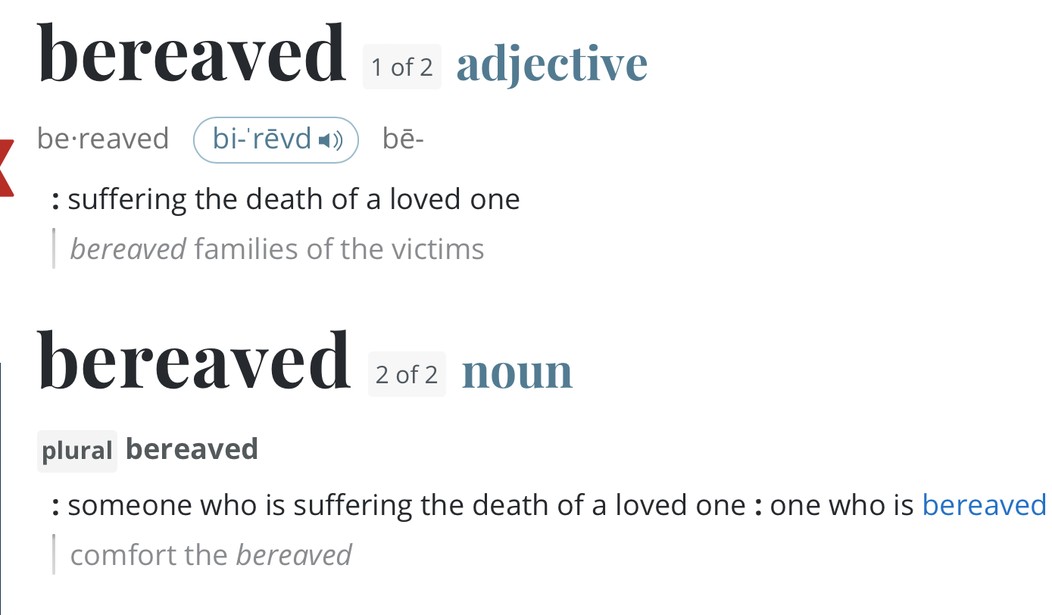If abortion isn’t terminating the life of a living human being, why do women who choose an abortion need “bereavement” leave? What, exactly, are they mourning?
I was struck by this question when I ran across a story about how governments and businesses are expanding their bereavement leave policies to include abortions. It seemed an odd move, given the fact that that the entire case for legalized abortion is based upon the premise that the fetus is not an actual human being. How can you be bereaved at the loss of a clump of cells without any meaningful existence?
Do I not understand what bereavement is, perhaps?
No, that’s not it. When I checked multiple dictionaries I found that they all agreed that bereavement is specifically related to the loss of a loved one. Not even just the loss of somebody you know, but specifically a loved one.
That’s what I thought.
Yet apparently this is a thing: HR magazine (there is such a thing!) calls it an emerging trend.
They couch the story in terms of “reproductive loss,” and I wholly agree that when a mother loses a pregnancy she should be given time to grieve the loss. But aborting a child is not a “reproductive loss;” it is the intentional termination of a pregnancy. This is the equivalent, it seems to me, of a parent-murdering child asking for mercy from the court on the basis of being an orphan.
This is, to put it mildly, bizarre and incoherent. Either the fetus is a person or it is not, but like Schrodinger’s cat it appears to be both depending upon how it is measured. In terms of abortion, the fetus is a clump of cells; but for the purposes of HR it is a loved one.
It makes my head spin and turns my stomach.
Out-of-the-box ideas like this prompt lots of questions: Who came up with this idea? When did this first start? And what areas of the country are impacted?
- Last fall, the City of Pittsburgh announced that it became the first government in the U.S. to provide up to three days of paid bereavement leave for employees experiencing pregnancy loss. The city’s legislation recognizes that pregnancy loss can occur in several forms, including miscarriage, stillbirth, termination, failed in vitro fertilization procedures, or surrogacy loss.
- Three days later, the Boston City Council passed a similar ordinance expanding its parental leave policy to include up to 12 weeks of paid leave for employees who experience a pregnancy loss due to miscarriage or termination. Under the previous policy, a stillbirth was the only covered pregnancy-related loss.
- The following month, Iowa’s Waterloo City Council unanimously passed a resolution establishing a paid bereavement policy following a pregnancy loss due to miscarriage or stillbirth. The resolution ordered the city’s HR department to craft the policy as well as communicate to employees who suffer a qualifying loss and are eligible to take the time off to grieve.
- A few days later, the City of Portland amended its leave policies to provide three days of paid bereavement leave for employees who experience pregnancy loss, including miscarriages, stillbirths, and other losses, defined as ”any other loss of pregnancy including termination, irrespective of whether deemed medically necessary and loss incurred during fertility treatment.”
The British Medical Journal (they have been popping up quite a bit of late in my articles) features a blog post that argues “abortion bereavement leave is part of abortion care,” a sentence that contains not one but two absurdities: “bereavement” and “care” in the same sentence as abortion.
On top of this, these policies have implications for the social construction of abortion. New Zealand’s decision to exclude abortion treats abortion as wholly different from miscarriage and was guided by a desire to avoid getting bogged down in debate. Nevertheless, the rule reinforces the sense that people having abortions are experiencing an undeserving kind of pregnancy loss. At a minimum, it reflects an extreme view of abortion as always being an indifferent matter of individual preference, at worst a sense that people having abortions are doing something wrong. These are inappropriate responses to something that is a) legal, b) healthcare, and c) often not a free choice (whether for socioeconomic reasons or medical reasons).
The profound insight that the Portland policy and the others illustrate is that abortion bereavement leave is part of abortion care. People respond differently to abortions (and the circumstances around abortions vary); for many, abortion is a deeply emotional experience and if some people require bereavement leave afterwards then it should absolutely be available. Abortion shouldn’t be treated as a luxury people should be grateful for or a shame people should pretend didn’t happen. (See NICE Guidelines 1.14.3-6.) Employers, and employment law, should recognise that abortion rights must include the right to engage in any required self-care afterwards.
I agree with that first sentence from the quote: these policies do indeed have implications for the “social construction” of abortion, and that is the point. When New Zealand excluded abortion from their bereavement leave policy they did so for a reason: it is ridiculous to call a person who killed their child bereaved. If an abortion is legal because the fetus is not a child, then the pregnancy did not terminate a “loved one.”
If you killed a “loved one,” you are a murderer. Sorry, that’s simply the case. This wasn’t pulling the plug on a brain dead relative; it was choosing to deny birth to a developing human being. If the act of aborting a fetus is not killing a loved one, then bereavement is at the very least the wrong category to classify leave after the process.
I can respect, if not agree with, somebody who genuinely believes that abortion is acceptable because a developing fetus is not a human being at the early stages of a pregnancy.
But this? Claiming a fetus is inhuman one moment and a “loved one” the next?
No. Just no.








Join the conversation as a VIP Member